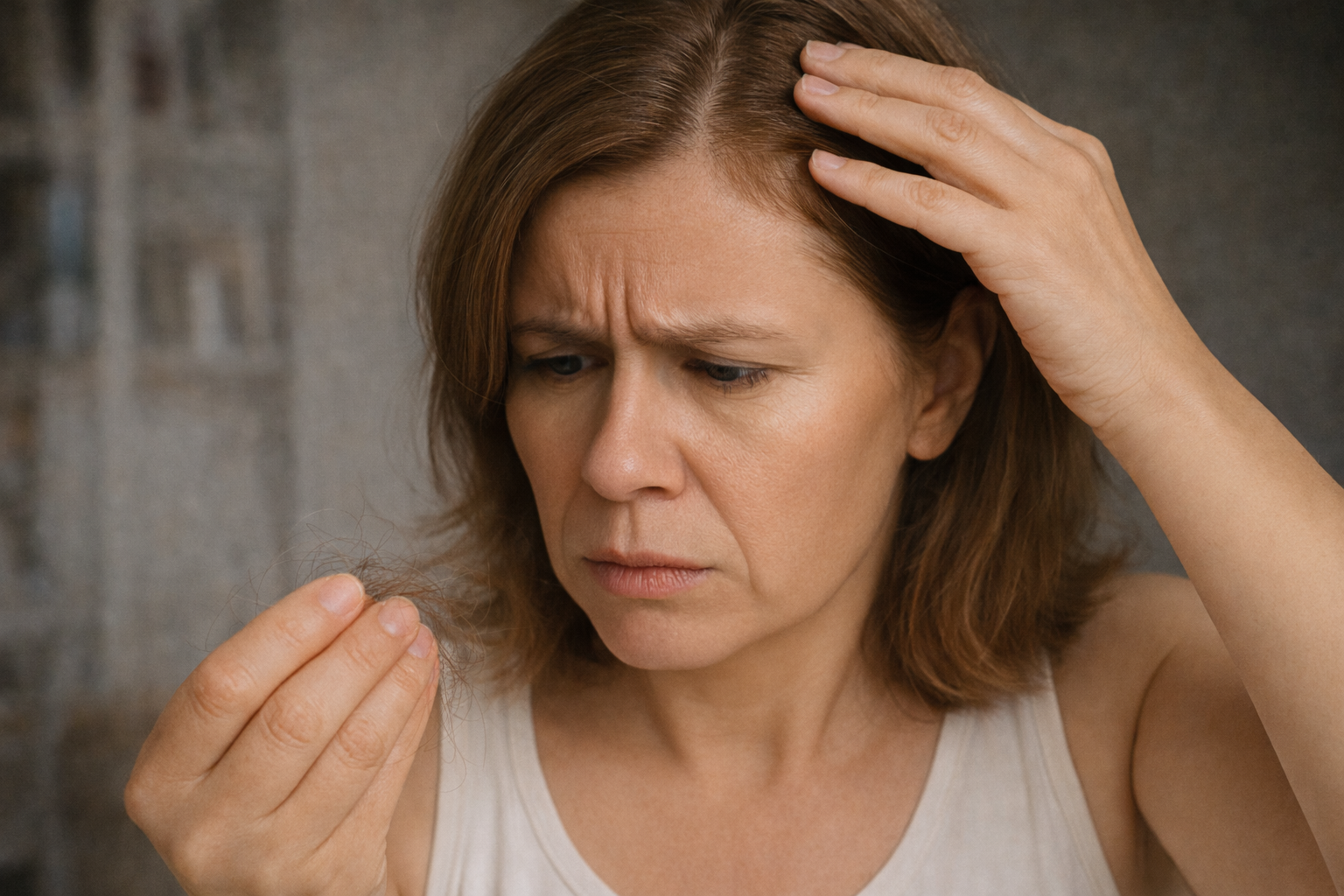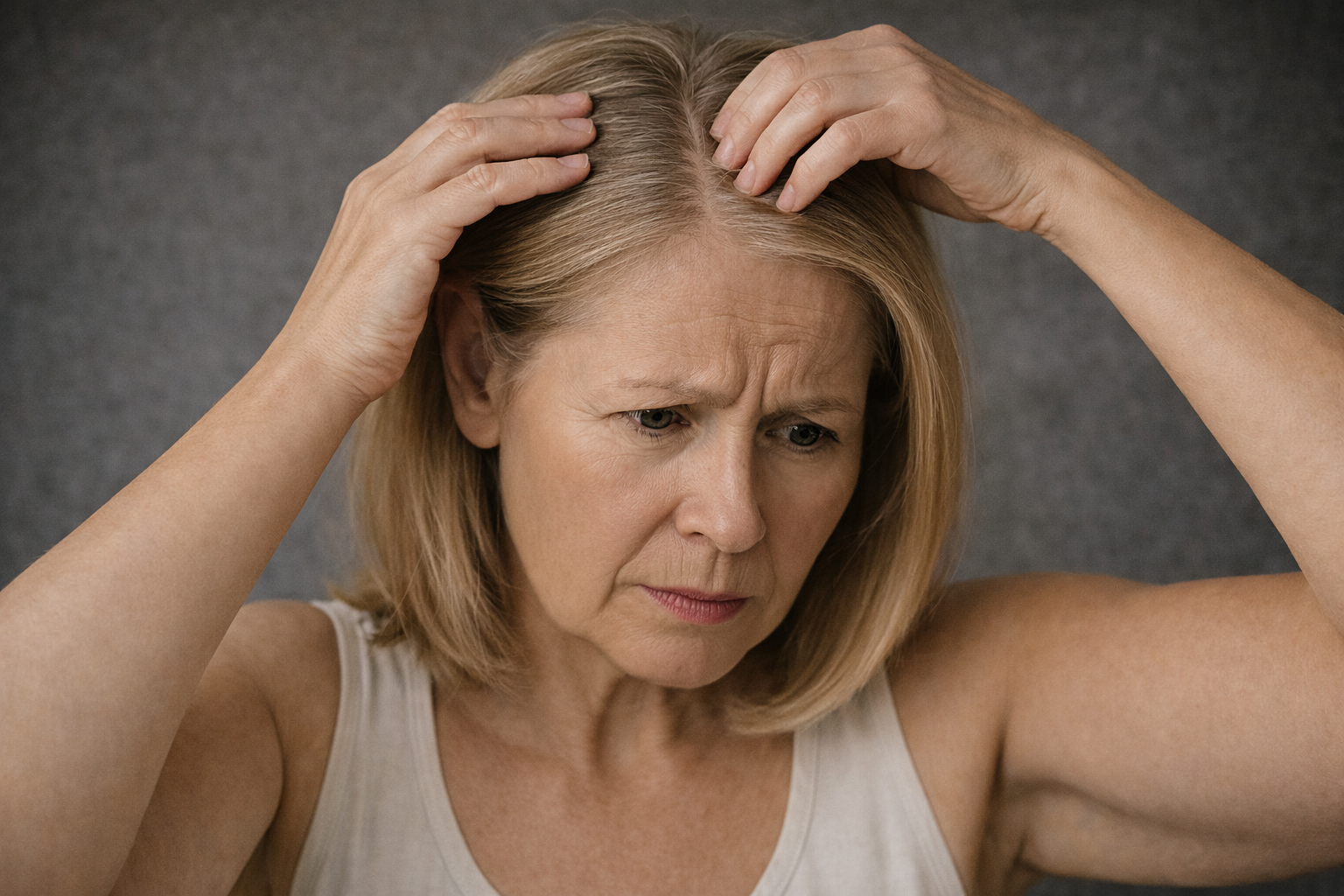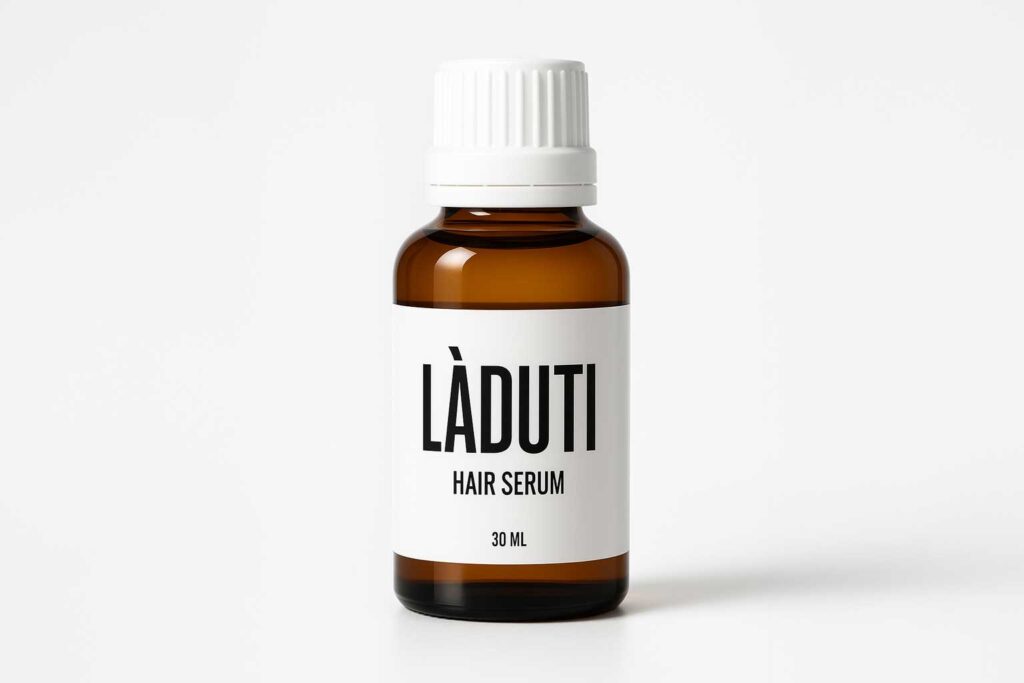Hair Loss in Women – Common Causes & Treatment

Hair loss is by no means just a problem for men. Women are also frequently affected - and at very different stages of life. Whether hormonal changes, stress or nutritional deficiencies: the causes are varied and often complex.
In this article, you will find out what causes hair loss in women, which symptoms are typical and which treatment options can help.
1. Causes of Hair Loss in Women
Hormonal changes
Pregnancy & breastfeeding
During pregnancy, a high oestrogen level often ensures particularly full and strong hair. After the birth, however, this level drops rapidly - the result is so-called postpartum hair loss. It typically occurs 2-4 months after giving birth and usually improves on its own after a few months.
Menopause
The hormone balance also changes during the menopause and is often a reason for hair loss in women. Decreasing oestrogen and a relative increase in androgens can cause hair to grow back thinner, especially around the crown.
Genetic predisposition
Women can also suffer from androgenetic alopecia. In this case, the hair follicles react sensitively to the hormone dihydrotestosterone (DHT).
- The growth phase of the hair (anagen phase) is shortened.
- Over time, hair grows back finer and shorter.
- Typical pattern in women: a thinning of the crown, more rarely complete baldness.
Stress & psychological strain
Chronic stress leads to an increased release of cortisol, which disrupts the hormonal balance and can worsen blood circulation to the scalp .
- Hair follicles are less well supplied.
- More hair enters the resting phase (telogen phase) → diffuse hair loss.
Tip: Many sufferers report that hair loss only occurs 2-3 months after a period of stress - it is important to understand the temporal relationship.
Nutrient deficiencies
A balanced diet is essential for hair health. If important building blocks are missing, this weakens the hair structure:
- Iron deficiency → most common cause of diffuse hair loss in women (e.g. due to heavy menstruation).
- Zinc → important for cell division and keratin formation.
- Vitamin D → regulates the hair cycle.
- Biotin (vitamin B7) → promotes keratin production and ensures strong hair.
Diseases & medication
Diseases or certain medications can also cause hair loss in women:
- Autoimmune diseases such as Hashimoto's thyroiditis indirectly attack the hair follicles.
- Drugs such as chemotherapeutic agents, blood thinners or antidepressants often have hair loss as a side effect.
2. Symptoms of Hair Loss in Women
Thinning of the crown
The first sign is often visible thinning in the parting area. The hair loses density so that the scalp shines through more clearly. This process begins gradually, particularly in the case of androgenetic hair loss, and is often only noticed when styling hair or in certain lighting conditions.
Typical features
- Scalp becomes increasingly visible
- Hair appears finer and less full overall
- Hair loss usually progresses slowly
Widening middle parting
Another classic symptom is a widening central parting. This pattern is particularly common in cases of hereditary hair loss (androgenetic alopecia). In contrast to men, who typically develop a receding hairline or a tonsure, hair loss in women usually occurs at the middle parting.
What those affected notice
- The crown looks unusually wide
- Hairstyles are more difficult to thicken or conceal
- Particularly noticeable in direct light or with wet hair
Diffuse hair loss in women
With diffuse hair loss, the hair thins out evenly over the entire head. The scalp shines through more strongly overall, without individual bald patches appearing. There can be many causes, including stress, hormonal changes or a lack of nutrients.
Characteristic signs
- Even thinning of hair all over the head
- Particularly visible in a plait or ponytail (hair appears thinner)
- Often accompanied by other symptoms such as tiredness or brittle nails (in deficiency states)
Circular bald patches (Alopecia Areata)
One particularly noticeable form is circular hair loss (alopecia areata). Here, clearly defined, round bald patches suddenly appear, which can occur individually or repeatedly. This form of hair loss is autoimmune, i.e. the immune system attacks the hair follicles directly.
Typical symptoms
- Suddenly appearing bald, round spots
- Usually without redness or scaling
- May occur on scalp, beard or eyebrows
- Often progresses in phases, with periods of hair loss and subsequent regrowth
Perception of hair loss in women
Women often notice hair loss earlier and more sensitively than men. Even a slight thinning or a slightly wider parting can be noticeable, as the visual change is more noticeable. This psychological pressure leads many women to seek medical help at an early stage - which is an advantage, as a quick diagnosis improves the chances of treatment.

3. Hair Loss in Women & Treatment Options
Nutrition & nutrients
A diet rich in vitamins and minerals is the basis for healthy hair. This is particularly important:
- Iron, zinc and biotin
- Omega-3 fatty acids (anti-inflammatory, e.g. from linseed oil, algae oil)
- Vitamin C (improves iron absorption)
Tip: If you suspect a deficiency, always do a blood test before taking supplements.
Stress management
Stress reduction is a decisive factor:
- Yoga, meditation, breathing exercises → lower cortisol.
- Sufficient sleep (7-8 hours per night) → promotes regeneration.
- Regular exercise → improves blood circulation and strengthens the immune system.
Medical therapies
In severe or genetic cases, doctors may prescribe the following options:
- Minoxidil (solution or foam) - promotes blood circulation and prolongs the growth phase.
- Hormone therapies - e.g. for oestrogen deficiency during the menopause.
- Cortisone preparations - for alopecia areata.
Caution: Medical treatments can have side effects and should only be used under medical supervision.
Natural alternatives
More and more women are turning to plant-based active ingredients that have a gentle effect and do not stress the scalp:
- Rosemary oil → promotes blood circulation.
- Caffeine → stimulates the hair roots.
- Ginseng → supports the regeneration of the follicles.
Scalp massages in combination with hair serums can also improve microcirculation and increase the absorption of active ingredients.
Conclusion: Treating hair loss in women is a holistic approach
Hair loss in women can have many causes - from hormonal fluctuations and stress to nutritional deficiencies or genetic factors. An individual diagnosis is crucial in order to choose the right treatment. In many cases, hair loss can be effectively alleviated with a combination of a healthy diet, stress management, targeted care and, if necessary, medical therapy. An early analysis is crucial to stop hair loss and stimulate new hair growth.
Supplementing with a high-quality hair serum can be particularly useful. They contain concentrated active ingredients such as biotin, caffeine, rosemary extract or special peptide complexes that act directly on the hair root. They can be easily integrated into the daily skincare routine, can improve blood circulation to the scalp, stimulate the hair follicles and thus strengthen the hair in the long term. In combination with a balanced diet and stress reduction, they offer effective, everyday support to promote hair growth and maintain hair density.
The Laduti Hair Growth Serum combines a variety of high-quality, natural ingredients that have been scientifically studied in relation to hair and scalp health. Particularly noteworthy are:
- Caffeine: Stimulates the hair roots and can prolong the growth phase.
- Biotin: Supports keratin formation and contributes to stronger hair structures.
- Panax Ginseng: Promotes microcirculation and improves the supply of nutrients to the hair follicles.
- Rosemary oil: Stimulates blood circulation in the scalp and strengthens the activity of the hair roots.
- Centella Asiatica (pennywort leaf extract): Protects the scalp from oxidative stress and supports its regeneration.
- Procapil™: An innovative active ingredient complex of oleanolic acid, apigenin and biotinoyl-GHK, which can improve hair anchoring and counteract hormone-induced hair loss.
- AnaGain™: A plant-based active ingredient derived from pea sprouts that specifically activates the signaling pathways for hair growth and can help to extend the growth phase of the hair.
By combining these natural active ingredients and innovative complexes, our serum offers modern, gentle and long-term care that strengthens your scalp and can create optimal conditions for healthy and stronger-looking hair.

FAQ
How can I recognize hormonal hair loss in women?
Typically, hair thinning occurs on the crown of the head or diffusely over the entire head - often linked to menstrual cycles, pregnancy/breastfeeding or the menopause.
Which natural active ingredients are useful?
Rosemary extract, caffeine, ginseng and formulated complexes such as AnaGain™ and Procapil™ are scientifically studied and can nourish the scalp and support the follicles.
When should I seek medical advice?
In the event of sudden, severe hair loss, bald patches, accompanying symptoms (tiredness, cycle changes) or if home remedies/care do not bring any improvement after 3-4 months.
How long does it take for a treatment to take effect?
Hair cycles are slow: initial changes usually take 3-6 months. Patience and a consistent routine are important.
Can I combine serums with other measures?
Yes. Many people combine a nutrient-rich diet, stress management and medically approved therapy with scalp care based on natural active ingredients.

